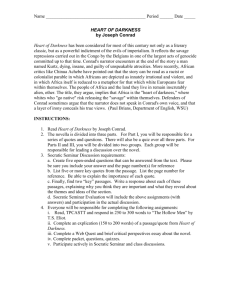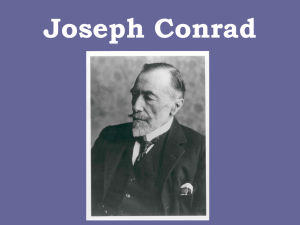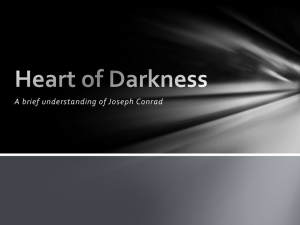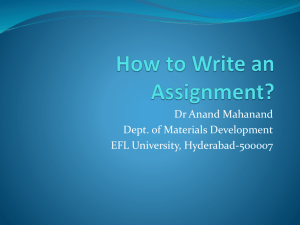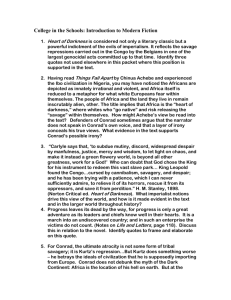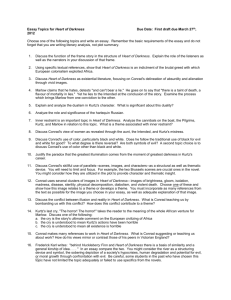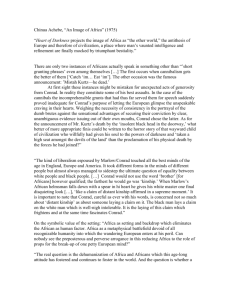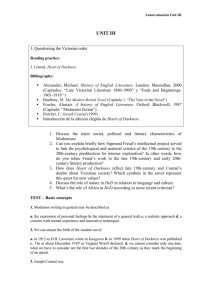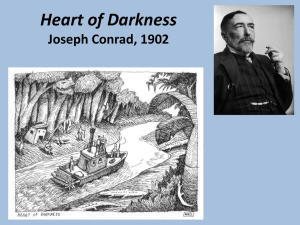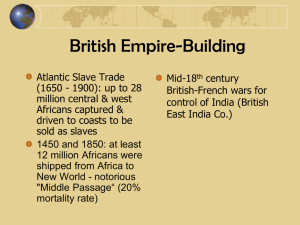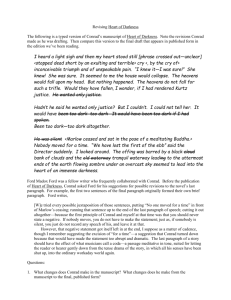Unit Overview - WordPress.com
advertisement
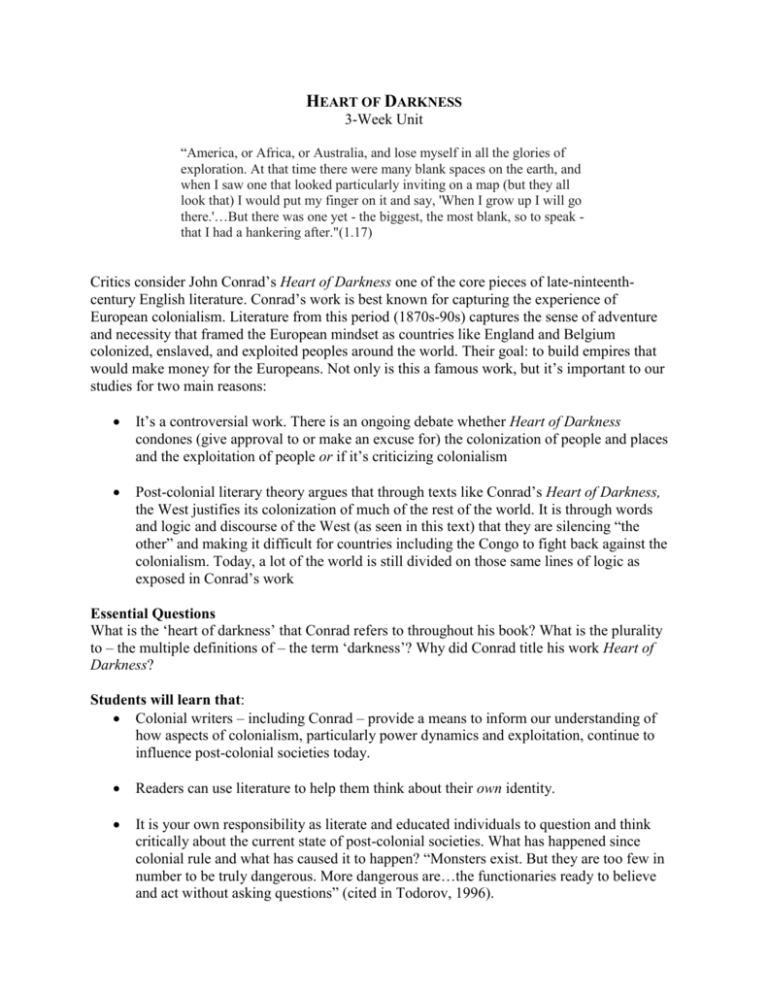
HEART OF DARKNESS 3-Week Unit “America, or Africa, or Australia, and lose myself in all the glories of exploration. At that time there were many blank spaces on the earth, and when I saw one that looked particularly inviting on a map (but they all look that) I would put my finger on it and say, 'When I grow up I will go there.'…But there was one yet - the biggest, the most blank, so to speak that I had a hankering after."(1.17) Critics consider John Conrad’s Heart of Darkness one of the core pieces of late-ninteenthcentury English literature. Conrad’s work is best known for capturing the experience of European colonialism. Literature from this period (1870s-90s) captures the sense of adventure and necessity that framed the European mindset as countries like England and Belgium colonized, enslaved, and exploited peoples around the world. Their goal: to build empires that would make money for the Europeans. Not only is this a famous work, but it’s important to our studies for two main reasons: It’s a controversial work. There is an ongoing debate whether Heart of Darkness condones (give approval to or make an excuse for) the colonization of people and places and the exploitation of people or if it’s criticizing colonialism Post-colonial literary theory argues that through texts like Conrad’s Heart of Darkness, the West justifies its colonization of much of the rest of the world. It is through words and logic and discourse of the West (as seen in this text) that they are silencing “the other” and making it difficult for countries including the Congo to fight back against the colonialism. Today, a lot of the world is still divided on those same lines of logic as exposed in Conrad’s work Essential Questions What is the ‘heart of darkness’ that Conrad refers to throughout his book? What is the plurality to – the multiple definitions of – the term ‘darkness’? Why did Conrad title his work Heart of Darkness? Students will learn that: Colonial writers – including Conrad – provide a means to inform our understanding of how aspects of colonialism, particularly power dynamics and exploitation, continue to influence post-colonial societies today. Readers can use literature to help them think about their own identity. It is your own responsibility as literate and educated individuals to question and think critically about the current state of post-colonial societies. What has happened since colonial rule and what has caused it to happen? “Monsters exist. But they are too few in number to be truly dangerous. More dangerous are…the functionaries ready to believe and act without asking questions” (cited in Todorov, 1996). Unit Expectations Refine close-reading and analysis skills; read historical texts (fiction and non-fiction) in order to further textual analysis; improve expository writing skills a) Nightly reading assignments b) Annotation and passage analysis assignments c) Daily, one-paragraph analytical response to the passage annotation you’ll share with your classmates d) In-class discussions and writing assignments using terminology from postcolonial theory to guide your analysis of the novella e) Intertextual reading and analysis of historical texts – fiction, nonfiction, and academic f) Final 3-4 page essay addressing the following question: What is the ‘heart of darkness’? Unit Texts Chinua Achebe’s “An Image of Africa” (selection) Joseph Conrad’s Heart of Darkness Adam Hochschild’s “Meeting Mr. Kurtz”, excerpt from King Leopold’s Ghost Rudyard Kipling’s “White Man’s Burden” George Orwell’s “Shooting an Elephant” Mark Twain’s “King Leopold’s Soliloquy” Specific Skills Developed CCSS.ELA-Literacy.RL.11-12.2 Determine two or more themes or central ideas of a text and analyze their development over the course of the text, including how they interact and build on one another to produce a complex account; provide an objective summary of the text. CCSS.ELA-Literacy.RI.11-12.6 Determine an author’s point of view or purpose in a text in which the rhetoric is particularly effective, analyzing how style and content contribute to the power, persuasiveness or beauty of the text. CCSS.ELA-Literacy.W.11-12.2 Write informative/explanatory texts to examine and convey complex ideas, concepts, and information clearly and accurately through the effective selection, organization, and analysis of content. Week One Colonialism and Imperialism Day one Briefly introduce text and time period (one or two minutes) Sleeping sickness image Reading “White Man’s Burden” Video and text of Imperial England: and excerpt from Wiki Exit Ticket: Dictionary definition of Imperialism HW: to write about “WM’sB” using at least 3 of the terms from the terminology sheet Day two - images of middle and upper-class British society British Colonialism Monet read Orwell’s Shooting an Elephant get through page 27 use one reading strategy each night – 7-8 Week Two Who is Mr Kurtz? Week Three Week Four
